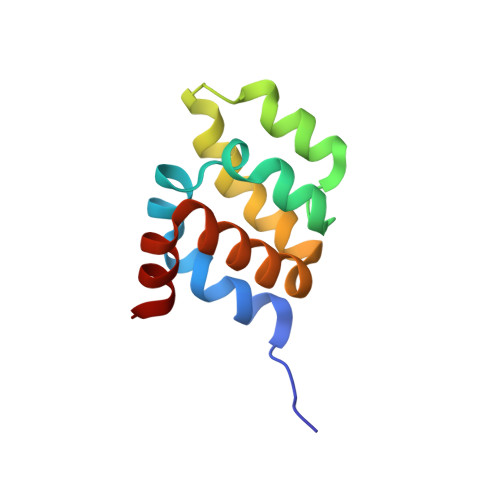Picomolar zinc binding modulates formation of Bcl10-nucleating assemblies of the caspase recruitment domain (CARD) of CARD9.
Holliday, M.J., Ferrao, R., de Leon Boenig, G., Estevez, A., Helgason, E., Rohou, A., Dueber, E.C., Fairbrother, W.J.(2018) J Biological Chem 293: 16803-16817
- PubMed: 30206119
- DOI: https://doi.org/10.1074/jbc.RA118.004821
- Primary Citation of Related Structures:
6E25, 6E26, 6E27, 6E28 - PubMed Abstract:
The caspase recruitment domain-containing protein 9 (CARD9)-B-cell lymphoma/leukemia 10 (Bcl10) signaling axis is activated in myeloid cells during the innate immune response to a variety of diverse pathogens. This signaling pathway requires a critical caspase recruitment domain (CARD)-CARD interaction between CARD9 and Bcl10 that promotes downstream activation of factors, including NF-κB and the mitogen-activated protein kinase (MAPK) p38. Despite these insights, CARD9 remains structurally uncharacterized, and little mechanistic understanding of its regulation exists. We unexpectedly found here that the CARD in CARD9 binds to Zn 2+ with picomolar affinity-a concentration comparable with the levels of readily accessible Zn 2+ in the cytosol. NMR solution structures of the CARD9-CARD in the apo and Zn 2+ -bound states revealed that Zn 2+ has little effect on the ground-state structure of the CARD; yet the stability of the domain increased considerably upon Zn 2+ binding, with a concomitant reduction in conformational flexibility. Moreover, Zn 2+ binding inhibited polymerization of the CARD9-CARD into helical assemblies. Here, we also present a 20-Å resolution negative-stain EM (NS-EM) structure of these filamentous assemblies and show that they adopt a similar helical symmetry as reported previously for filaments of the Bcl10 CARD. Using both bulk assays and direct NS-EM visualization, we further show that the CARD9-CARD assemblies can directly template and thereby nucleate Bcl10 polymerization, a capacity considered critical to propagation of the CARD9-Bcl10 signaling cascade. Our findings indicate that CARD9 is a potential target of Zn 2+ -mediated signaling that affects Bcl10 polymerization in innate immune responses.
- From the Early Discovery Biochemistry Department and.
Organizational Affiliation:
















